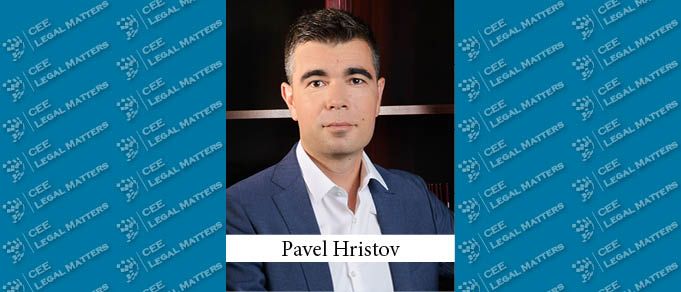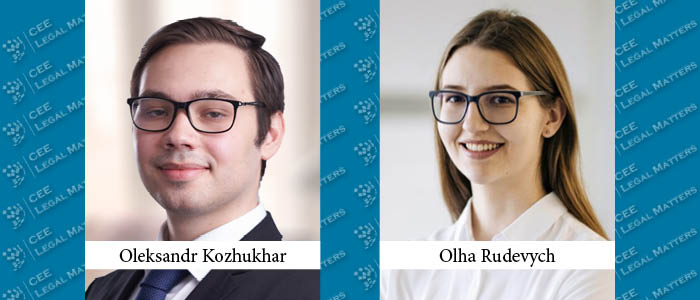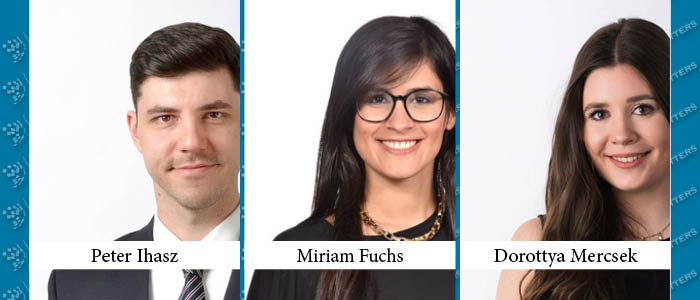Pavel Hristov opened the doors of Bulgaria’s Hristov & Partners law firm in 2013. Since then, his firm has grown steadily, and today competes on even terms with the long-established powers on the Bulgarian law firm market. We sat down with Hristov, himself a highly-regarded commercial lawyer, to learn about his firm’s history, strategy, and success.
CEELM: What makes Hristov & Partners stand out? What are your main selling points?
Pavel: Double R: Reputation and Recommendation. Every matter that we take we do our best on. For this reason, we do not claim and we do not try to be a full-service firm. We are specialists in three areas that we focus on – Corporate / M&A, Competition / Anti-Trust, and general Commercial / Transactional. The last of these basically includes any kind of challenges that, say, a Bulgarian exporting company can face trying to export and trying to negotiate a contract with a foreign partner. And, if we work on an M&A deal, and the clients are satisfied, and they wish to continue working with us and instruct us on their day-to-day matters. This happens in about 80% of the cases.
CEELM: Anything else?
Pavel: Let me step back a bit. During the privatization period the government officials – the so-called privatization agency – used to prepare the entire set of documents only in the Bulgarian language. For example, when the tender for the concessions for the airports in Varna and Burgas in 2006 was announced, the entire set of documents was made available only in Bulgarian – thousands of pages of important legal documents and information. And this meant that for all the law firms that participated in this, quite a significant part of their work in terms of time was legal translation. We had to translate what the Bulgarian legal language meant, and then we had to communicate that to the clients, and how they should calculate their risks and prepare their bids in order to be compliant. So we started like this – we started with translation. And to add value we not only translated the legal texts, but also the context.
And when I started my professional career 15 years ago, many of the lawyers were absolutely comfortable with their technical knowledge, and sending across and stating to the client in good English what the law meant, and providing a legal technical analysis of specific provisions of the law. But they didn’t feel comfortable if they had to provide context, and they didn’t feel comfortable if they had to give advice that involved projecting what would happen in the next five years, when the business actually operated.
But we learned. We learned that these are the questions that experienced foreign investors coming to Bulgaria after having entered numerous other countries and numerous other jurisdictions want answered. It was a blessing to start by working on the deals of the first big private equity firms coming to Bulgaria, which brought in huge teams of experienced foreign legal advisors with them. We started picking up their quality and their style of advice, as well as their integrity and their commitment to their clients – and this is how we differentiate ourselves. Our focus is that we support and act alongside international law firms doing deals in Bulgaria.
And another thing is that because we try to focus mostly on M&A deals and the bigger mandates in the area of competition and commercial law, our client base is by definition limited. We have a much narrower client base, which helps us avoid being conflicted out of larger transactions. For example, one of the largest transactions we ever worked on came to us due to a conflict that existed in the primary partner firm of the client here in Bulgaria, so the international law firm turned to us. Because we were not conflicted out, we were able to work on one of the biggest transactions in Bulgaria that year.
CEELM: What’s Hristov & Partners’ history?
Pavel: I was at Boyanov & Co. for four years, and then I spent six years with CMS Cameron McKenna helping them strengthen their M&A and Competition practices in Bulgaria, which were nowhere to be seen before that. And then I started this firm in 2013 together with two other former CMS lawyers Kremena Stoyanova and Iordan Iordanov. Kremena, who is a Counsel and our Real Estate practice head, was the Head of Real Estate and Employment at Cameron McKenna for several years, and then she decided that bigger was not better for her, and she decided to start her own practice and focus on the areas she likes and avoid those she doesn’t.
CEELM: Are they still here?
Pavel: Not Iordan. He left to start his own firm one year later, in 2014.
CEELM: You say you focus on working with international law firms. Does that mean you try to develop referral relationships?
Pavel: Yes, that’s a big part of what we do. We meet with them, we go to events – quality events – especially where part of the time is dedicated to networking, basically to communicate face to face. This is the important aspect. And then we talk. And then it turns out that sometimes we have common clients, sometimes we know other lawyers from their firms. Maybe we’ve worked on transactions with other lawyers from their firms that can recommend us, and vice versa.
CEELM: That raises an interesting subject. Do you have good relationship with competing firms in Bulgaria, and do you refer work back and forth?
Pavel: It’s awkward in Bulgaria. We have a very good relationship with many of the law firms, especially the ones who are doing M&A and competition, and we know each other on a personal level. With some of them we are even friends. But in terms of referrals, it has proved to be quite difficult to refer work to another Bulgarian law firm. For various reasons. Some are subjective, some are objective. It’s hard for me to say why it doesn’t work. It happens quite rarely. It could happen much more often, but it doesn’t.
CEELM: What about outbound? Do you refer work to firms outside Bulgaria?
Pavel: Again, rarely. Because in order not to be conflicted out we have a very small number of Bulgarian clients. We have a few who are quite ambitious, and some of them try to grow abroad, or engage in cross-border transactions, so they need foreign advice, and that’s a time when we can refer them, but we only have a few of those clients.
CEELM: How many lawyers and how many partners are there today?
Pavel: We have three partners and three senior counsel and one associate. Aldin Shenkov is based in Plovdiv, and his practice is focused mostly there; we work together on an ad hoc project basis. Biliana Shagova is the third partner. For ten years she used to work for the busiest boutique law firm in the energy field. After ten years with that firm, Biliana decided that she wanted to start her own practice, and I convinced her that two was better than one. So she joined, initially as a counsel. This is the normal pattern here. Develop the practice, develop a group of clients, develop a reputation, and commit to the firm, then you are a partner.
CEELM: This is an interesting model. With so few associates, the senior lawyers must do most of the work themselves.
Pavel: We don’t have a single client who expects junior lawyers to work on their matters. I don’t know if we selectively choose these kinds of demanding and sophisticated clients, or this is our reputation, so we attract only these kinds of clients. But for seven years we haven’t had one client say, “well, this kind of work should be done by a junior lawyer.”
CEELM: Does that mean you don’t work on large due diligence exercises?
Pavel: Of course we do. We just do them ourselves. Nobody expects that there should be a huge due diligence exercise, with tens of lawyers sitting around the table and reading through thousands of pages. Nobody expects that, and nobody has time to wait for that. The time it takes to do this kind of due diligence and produce a due diligence report with an executive summary of 150 pages [rolls his eyes]. We have committed and very focused, very experienced clients, and they expect real time advice. And real time action. Which means that the client expects daily updates of what’s going on, and what will be the issues and what will be the appropriate actions to remedy them. Immediately. Not in two weeks, when the due diligence report can be prepared, and then it takes more time to read it, and then more time to explain it. And then – eventually, if you are lucky – one of the partners in the law firm will have taken the time to read through the due diligence report himself and then understand the issues and then communicate them. We don’t waste time for that.
There’s another way of explaining this. For instance, at the end of 2016 we worked with Dentons in advising Group Spadel on its EUR 120 million acquisition of Devin AD, the largest Bulgarian bottled water producer, from Advent International. Guess how many lawyers Dentons had on this transaction? Four. And our team here in Sofia was six lawyers. Just six lawyers. That was absolutely sufficient for a full due diligence.
CEELM: But there are only seven people in the firm. If six are working on one transaction, that must mean you can’t really work on more than one deal at the same time.
Pavel: We can and we do. To illustrate that, in parallel to the Spadel/Devin transaction we acted for G4S plc. on the divestment of their Bulgarian business to VIP Security, which is the largest deal in the security industry in Bulgaria to date. First of all, we’re pretty good lawyers. Among the best in the market. So yes, we work extra time when necessary on projects. And yes, we say no to some clients. We don’t take every opportunity to work, and every mandate, and on every area and in every industry. We try to develop our expertise and reputation in specific industries and specific practices.
Plus, we are efficient. We do things efficiently, and we try to avoid any miscommunication and any misunderstanding with the client in the very beginning. We learned the hard way that scoping is the most important thing in a transaction, and managing expectations. Explain the scope, agree on the scope and timeline, shake hands with the client, and commit to that. When you have real-time-communication with the client, this is the opportunity to adjust and to adapt. We have the ability to refocus and be flexible and adapt in the course of a transaction. Which is a big differentiator in a firm with seven lawyers doing a large transaction, compared to a firm with 40 lawyers trying to do the same transaction.
But also, this is not really so unusual here. The firms we compete with – the other best law firms in the Bulgarian market – look at their structure. They also have a lot of partners, and a lot of senior associates. So this is a common model here. One of the reasons is the fee levels in the country. Bulgaria probably has the lowest hourly rates in Central and Eastern Europe. So for this reason, for our model to be sustainable, one of the options is that you focus the work on where it’s the most profitable, where it’s the most necessary.





























